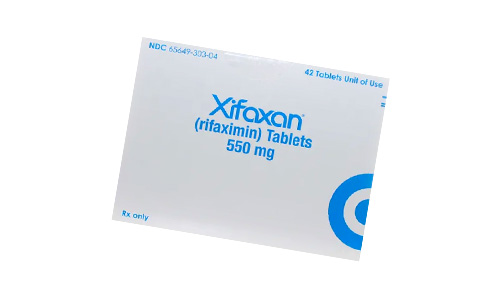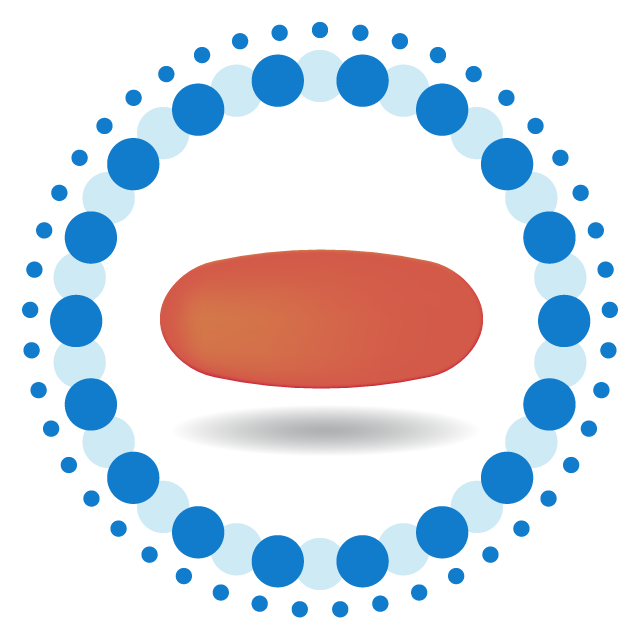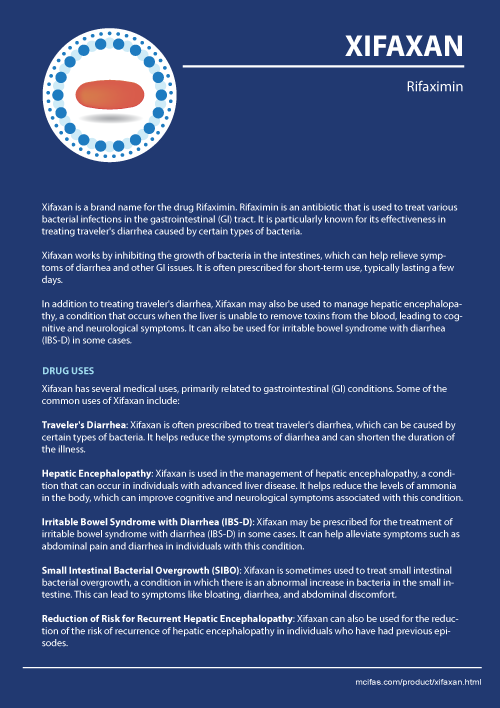Xifaxan Prescribing Information
Xifaxan is a brand name for the drug Rifaximin. Rifaximin is an antibiotic that is used to treat various bacterial infections in the gastrointestinal (GI) tract. It is particularly known for its effectiveness in treating traveler's diarrhea caused by certain types of bacteria.
Rifaximin works by inhibiting the growth of bacteria in the intestines, which can help relieve symptoms of diarrhea and other GI issues. It is often prescribed for short-term use, typically lasting a few days.
In addition to treating traveler's diarrhea, Xifaxan may also be used to manage hepatic encephalopathy, a condition that occurs when the liver is unable to remove toxins from the blood, leading to cognitive and neurological symptoms. It can also be used for irritable bowel syndrome with diarrhea (IBS-D) in some cases.

Uses of Xifaxan
Xifaxan has several medical uses, primarily related to gastrointestinal (GI) conditions. Some of the common uses include:
- Traveler's Diarrhea: Xifaxan is often prescribed to treat traveler's diarrhea, which can be caused by certain types of bacteria. It helps reduce the symptoms of diarrhea and can shorten the duration of the illness.
- Hepatic Encephalopathy: Antibiotic is used in the management of hepatic encephalopathy, a condition that can occur in individuals with advanced liver disease. It helps reduce the levels of ammonia in the body, which can improve cognitive and neurological symptoms associated with this condition.
- Irritable Bowel Syndrome with Diarrhea (IBS-D): Xifaxan may be prescribed for the treatment of irritable bowel syndrome with diarrhea (IBS-D) in some cases. It can help alleviate symptoms such as abdominal pain and diarrhea in individuals with this condition.
- Small Intestinal Bacterial Overgrowth (SIBO): Rifaximin is sometimes used to treat small intestinal bacterial overgrowth, a condition in which there is an abnormal increase in bacteria in the small intestine. This can lead to symptoms like bloating, diarrhea, and abdominal discomfort.
- Reduction of Risk for Recurrent Hepatic Encephalopathy: Xifaxan can also be used for the reduction of the risk of recurrence of hepatic encephalopathy in individuals who have had previous episodes.
Dosage
The dosage of Xifaxan can vary depending on the specific condition being treated and individual patient factors. Below are some general guidelines for the typical dosages for its common uses:
Traveler's Diarrhea:
- The usual adult dosage is 200 mg (one tablet) taken orally three times a day for three days.
Hepatic Encephalopathy:
- The usual adult dosage is 550 mg (two 275 mg tablets) taken orally two times a day.
Irritable Bowel Syndrome with Diarrhea (IBS-D):
- The usual adult dosage is 550 mg (two 275 mg tablets) taken orally three times a day for 14 days.
Small Intestinal Bacterial Overgrowth (SIBO):
- The usual adult dosage is 550 mg (two 275 mg tablets) taken orally three times a day for 14 days.
Do not take more or less than the prescribed dose, and do not stop taking it prematurely, even if you start feeling better.
It's also important to note that Xifaxan may be available in different tablet strengths (such as 200 mg or 550 mg), so the number of tablets you take per dose may vary depending on the strength of the tablets prescribed by your doctor.
Side Effects of Xifaxan
Antibiotic is generally well-tolerated, but like all medications, it can have side effects. Not everyone will experience these side effects, and some people may experience them to a greater degree than others. Common side effects can include:
- Nausea: Some individuals may experience mild nausea while taking Xifaxan.
- Abdominal Pain: Abdominal discomfort or pain is a possible side effect.
- Bloating: Bloating and increased gas production can occur in some people.
- Headache: Headaches may occur as a side effect of Rifaximin.
- Dizziness: Some individuals may feel dizzy while taking this medication.
- Fatigue: Antibiotic can cause feelings of tiredness or fatigue.
- Constipation: Although Xifaxan is often used to treat diarrhea, it can occasionally lead to constipation.
- Fever: In some cases, individuals may experience fever as a side effect.
- Rash: Skin rash or itching is a less common side effect but can occur.
- Allergic Reactions: While rare, some individuals may experience severe allergic reactions to Xifaxan, such as hives, difficulty breathing, or swelling of the face, lips, tongue, or throat. If you experience any signs of an allergic reaction, seek immediate medical attention.
Interaction with other drugs
Xifaxan can interact with other drugs, potentially affecting their effectiveness or increasing the risk of side effects. Here are some common drug interactions:
- Drugs That Affect Liver Enzymes: Antibiotic is primarily metabolized by enzymes in the liver. Drugs that induce or inhibit these liver enzymes can affect the concentration of Xifaxan in your body. Some examples include:
- Strong CYP3A4 Inhibitors: Medications like ketoconazole, itraconazole, and ritonavir can increase Xifaxan levels in your bloodstream, potentially leading to an increased risk of side effects.
- CYP3A4 Inducers: Drugs such as rifampin and phenytoin may reduce Xifaxan's effectiveness.
- Glycopyrrolate: Concurrent use of glycopyrrolate and Xifaxan may increase the risk of constipation.
- P-glycoprotein (P-gp) Inhibitors: Rifaximin is a substrate for P-glycoprotein. Concomitant use with strong P-gp inhibitors like cyclosporine may increase Xifaxan levels in the body.
- Warfarin: Medicine may enhance the anticoagulant effects of warfarin, potentially increasing the risk of bleeding. Your doctor may need to adjust your warfarin dosage and monitor your clotting parameters closely if you are taking both medications.
- Drugs Affecting Gastrointestinal Motility: Xifaxan is designed to stay in the gut and not get absorbed systemically. Drugs that alter gastrointestinal motility (e.g., metoclopramide) could potentially affect the absorption and effectiveness of Xifaxan.
- Other Antibiotics: Concurrent use of other antibiotics may affect the balance of gut bacteria and reduce the effectiveness of Xifaxan in treating conditions like traveler's diarrhea or small intestinal bacterial overgrowth (SIBO).
What to avoid while on Xifaxan
When taking Xifaxan, there are certain precautions and considerations to keep in mind to maximize its effectiveness and minimize potential interactions or side effects. Here are some things to avoid or be cautious about while on Rifaximin:
- Alcohol: It's generally advisable to avoid alcohol or limit its consumption while taking this drug. Alcohol can strain the liver, and since Xifaxan is metabolized in the liver, excessive alcohol use could potentially affect its metabolism and effectiveness.
- Grapefruit and Grapefruit Juice: Grapefruit and grapefruit juice can interact with some medications, including Rifaximin. These can inhibit the activity of certain enzymes in the liver, potentially affecting how Xifaxan is metabolized. It's best to avoid grapefruit products while taking Xifaxan.
- Other Medications: Some medications can interact with Xifaxan, as mentioned in the previous response.
- High-Fiber Supplements: Medicine is designed to stay in the gut and not get absorbed systemically, so high-fiber supplements might affect its absorption and effectiveness.
- Dietary Changes: In the case of conditions like small intestinal bacterial overgrowth (SIBO) or irritable bowel syndrome with diarrhea (IBS-D) follow dietary recommendations carefully.
- Driving and Operating Machinery: Xifaxan can cause dizziness and fatigue in some individuals. If you experience these side effects, avoid activities that require mental alertness, such as driving or operating heavy machinery, until you know how the medication affects you.
- Allergens: If you have known allergies or sensitivities to any ingredients in Xifaxan, make sure to inform your healthcare provider. They can prescribe an alternative medication if necessary.
Contraindications of Xifaxan
Xifaxan has specific contraindications, which are situations or conditions where the use of the medication is not recommended due to potential risks. Some contraindications include:
- Known Allergy or Hypersensitivity: Do not take Xifaxan if you have a known allergy or hypersensitivity to Rifaximin or any of the ingredients in the medication. Allergic reactions can be severe and life-threatening.
- Hypersensitivity to Rifamycins: Rifaximin belongs to a class of antibiotics called rifamycins. If you have had a hypersensitivity reaction to other rifamycin antibiotics, such as rifampin, you should avoid Xifaxan.
- Severe Liver Impairment: Xifaxan is primarily metabolized in the liver. If you have severe liver impairment (Child-Pugh Class C), Xifaxan use is generally not recommended, as it could potentially lead to increased drug levels in the bloodstream.
- Use as a Primary Prophylactic Agent for Traveler's Diarrhea: Antibiotic is not typically recommended as a primary prophylactic (preventative) agent for traveler's diarrhea. It is usually prescribed for the treatment of traveler's diarrhea once it has occurred. Prevention strategies such as food and water precautions are typically recommended before considering Xifaxan for prevention.
- Use in Acute Bacterial Infections Outside the GI Tract: Tablets is specifically designed to work in the gastrointestinal (GI) tract. It is not effective for treating acute bacterial infections in other parts of the body and should not be used for such purposes.
- Children: Xifaxan's safety and effectiveness have not been established in children under the age of 12. It is typically not prescribed for pediatric use.
Pregnancy and Xifaxan
The use of Xifaxan during pregnancy should be carefully considered and discussed with a healthcare provider. Here are some important points to consider:
- Limited Data: There is limited data on the use of Xifaxan during pregnancy, particularly in humans. Animal studies have not shown significant risks, but these findings may not directly apply to humans.
- Risk vs. Benefit Assessment: The decision to use Rifaximin during pregnancy should be based on a thorough assessment of the potential benefits compared to the potential risks to both the mother and the developing fetus.
- Specific Indication: Antibiotic is primarily prescribed for gastrointestinal conditions, such as traveler's diarrhea, hepatic encephalopathy, and irritable bowel syndrome with diarrhea (IBS-D). In some cases, these conditions may be severe or pose significant risks to the health of the pregnant individual, and the benefits of treatment may outweigh potential risks.
- Breastfeeding: It is not known whether Xifaxan is excreted in human breast milk.
» Drug Uses (format pdf, 0.2 Mb)



